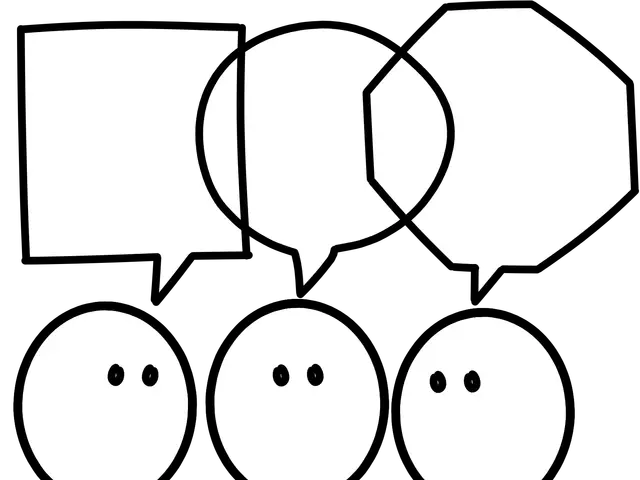A Full Day of Uninterrupted Wakefulness
Skipping 24 hours of shut-eye ain't no walk in the park. Your body and brain start to feel the strain as sleep deprivation sets in. Here's what happens during this period:
The 24-hour Mark
Finally, you've hit the mark - 24 hours without sleep. You're probably feeling tired, and your cognitive abilities are getting impaired. But what if you can't catch those Z's even after a day? Well, things get worse the longer you stay awake.
At this point, you're likely dealing with sleep deprivation, a medical condition caused by inadequate sleep (1). You might find yourself nodding off during conversations, dozing in public, or feeling drowsy behind the wheel.
The cognitive effects start setting in within 24 hours, leaving you with slowed reaction times, poor memory, and impaired concentration (2). But don't worry, if it's just for a day, your body can bounce back.
The 36-hour Stretch
Things become tougher when you've been awake for 36 hours. Your body is feeling the strain, and the side effects intensify.
One noticeable issue is hormone imbalances. Your body may have trouble producing and releasing hormones efficiently, causing mood swings or an overall sense of discomfort. Your metabolism slows down, which can lead to weight gain and related health issues if it becomes a pattern (3).
At the same time, appetite and body temperature may fluctuate, leaving you feeling out of sorts. High blood pressure also poses a significant risk during prolonged wakefulness, increasing the chances of heart disease or stroke (3).
Inflammatory markers within the body may increase, indicating stress or potential damage (3). Cognitively, your abilities start to wane, making tasks like driving, cooking, or even making a simple cup of tea difficult. Speech may become labored, making communication a challenge (3).
Pulling an All-nighter: 48 Hours Without Sleep
Going 48 hours without sleep is serious sleep deprivation. By this point, it's hard to keep your eyes open, and you might experience Microsleep Episodes frequently, posing a significant risk to your safety and those around you.
Some signs of severe sleep deprivation after 48 hours include temporal disorientation, hallucinations, anxiety, extreme mood swings, irritability, depersonalization (3).
The Long Haul: 72 Hours Without Sleep
At the 72-hour mark, your body and brain are screaming for some rest. It's severe sleep deprivation at this stage, and it's your brain's way of telling you that it needs to recuperate.
During prolonged periods without sleep, your perception of the world and your ability to read other people's emotions take a significant hit (4). You're likely to experience hallucinations, making it increasingly difficult to interpret your surroundings.
A study involving 12 astronauts discovered some worrying effects of staying awake for 72 hours, including increased heart rates, extreme mood fluctuations, and reduced ability to process information (4).
Short-term Effects of Sleep Deprivation
Sleep deprivation can have a drastic impact on your cognitive and physical functions within 24 hours. Symptoms include drowsiness, increased distractibility, decreased performance, cognitive impairment, and a higher likelihood of accidents or injuries.
Some researchers have even found that the effects of 17 to 19 hours without sleep are comparable to or worse than that of a blood alcohol concentration (0.05%) (6), (7). This highlights the potential dangers of sleep deprivation, especially during activities requiring alertness, like driving or operating machinery.
Impact on Mental and Physical Health
Lack of sleep can increase the risk of mental health conditions such as anxiety or depression (8). Mentally, it can lead to mood disturbances, elevated stress levels, and cognitive impairments affecting memory, attention, and decision-making. Physically, insufficient sleep can disrupt metabolic processes, potentially leading to weight gain, insulin resistance, and an increased risk of type 2 diabetes.
Recent studies have shown that poor sleep habits are linked to greater fluctuations in blood sugar levels, increasing the risk of chronic diseases (9).
Long-term Risk of Sleep Deprivation
Persistent sleep deprivation is associated with significant long-term health risks, such as chronic inflammation, which doubles the risk of cancer and boosts the risk of developing Alzheimer's disease (10). Long-term sleep deficits also impair immune function, making individuals more susceptible to infections.
Recovering After 24 Hours Without Sleep
After losing a full day's sleep, it's essential to focus on getting enough rest. Stick to a consistent sleep schedule, practice good sleep hygiene, take short naps, get regular natural light exposure, and maintain a balanced diet and hydration levels to speed up your recovery.
If you're experiencing prolonged sleep issues for three months or more, it's best to consult a healthcare professional.
Need help getting some shut-eye? Check out ShutEye®, an app that tracks and analyzes your sleep patterns, offering personalized tips to improve your sleep quality.
- Prolonged sleep deprivation, such as 24 hours without sleep, can impair cognitive abilities, causing slowed reaction times, poor memory, and impaired concentration.
- After 36 hours without sleep, hormone imbalances may occur, leading to mood swings, discomfort, and potential health issues like weight gain, high blood pressure, and heart disease.
- When someone struggles with sleep deprivation for 48 hours, they may experience temporal disorientation, hallucinations, anxiety, extreme mood swings, irritability, depersonalization, and an increased risk of accidents.
- At the 72-hour mark without sleep, individuals are likely to experience hallucinations, impaired perception of the world, and a reduced ability to process information, which can increase the risk of chronic diseases and mental health conditions like depression and Alzheimer's disease. Improving sleep hygiene and consulting a healthcare professional for chronic sleep issues can help manage these risks and promote overall health and wellness, including mental health.






